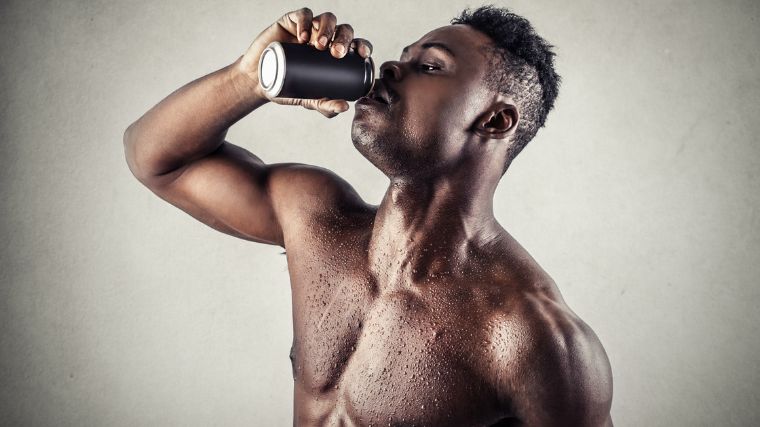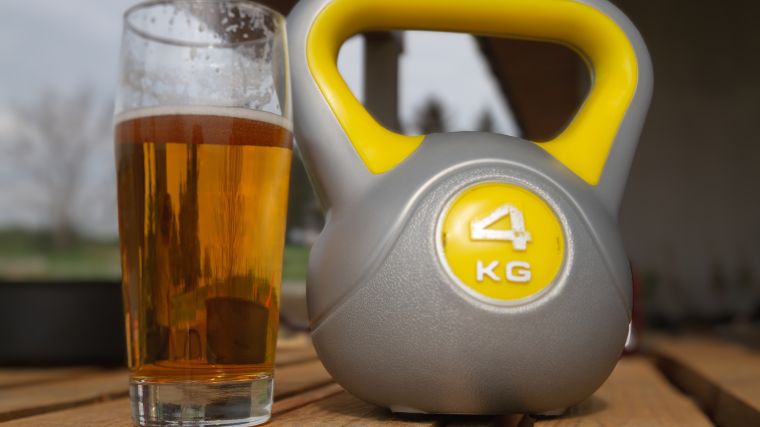If you were a teenager or young adult in the latter half of the ‘aughts, you were probably aware of (or partook in) the infamous Four Loko drink. The “premium malt beer beverage” was all the rage among partiers at the time.
Why? The original Four Loko formulation bore a remarkable resemblance to the ingredients you’d find in a typical pre-workout powder: Namely, more than a scant amount of caffeine. By 2009, Four Loko was under fire from the media and government regulators alike for bucking public health policy. (1)

One year later, the Food & Drug Administration issued a ban on caffeinated alcoholic beverages (forcing Four Loko to alter their formulation as well). (2) Whether you were privy to the Four Loko lore or not, the story stands as a sharp reminder of the consequences of mixing what was essentially pre-workout with alcohol. Before you spice up your next gym session with caffeine and a cold one, there are a few things you should know.
Editor’s Note: The content on BarBend is meant to be informative in nature, but it should not be taken as medical advice. When starting a new training regimen and/or diet, it is always a good idea to consult with a trusted medical professional. We are not a medical resource. The opinions and articles on this site are not intended for use as diagnosis, prevention, and/or treatment of health problems. They are not substitutes for consulting a qualified medical professional.
Side Effects of Mixing Pre-Workout With Alcohol
Strictly speaking, alcohol and fitness tend to have an antagonistic relationship. As the saying goes, the dose makes the poison — however, there isn’t much ground to gain in the gym by pounding a hard beverage before hitting the weights.
[Read More: The Best Foods for Energy Before, During, and After Your Workouts]
This is doubly true if you habitually consume pre-workout supplements to boost your performance in the weight room or on the track. Caffeine, the principal active ingredient in most pre-workouts, can have a number of harmful interactions with alcohol:
- Alcohol and caffeine produce what some experts have called a “wide-awake drunk,” (2) which dampens your perception of inebriation until the immediate effects of caffeine (or your pre-workout) have worn off. (6)
- Both caffeine and alcohol are diuretics; they increase the rate at which your body sheds water. (3) This may impact workout performance, but could depend on the amount of alcohol consumed before a workout. Low-alcohol-content beverages may not significantly dehydrate you. (4)
- Many popular pre-workout ingredients are designed to sharpen reaction time and muscular coordination, but alcohol diminishes them. (5) This could mean that combining pre-workouts with alcoholic beverages reduces some of the performance-enhancing benefits of the former, but more specific data is needed to confirm.
Note that there’s a very limited amount of research specifically studying the interactions and consequences of name-brand pre-workout powders and alcohol. Caffeine is far and away the most widespread and potent ingredient in most ‘pres, though, so it’s pretty safe to infer based on data studying caffeine and alcohol. (6)
What Is Pre-Workout?
If you like to hit the gym recreationally or as part of training for a sport, you’re probably aware of pre-workouts. They’re all the rage for gym rats as a quick way to enhance energy levels, boost mood, and increase performance.
[RELATED: Best Pre-Workout]
Pre-workouts are typically sold in powder form but may also come in capsules or even as edible snacks. Almost all ‘pres contain some combination of these active ingredients (though specific products may contain more or different profiles): (7)
- Caffeine
- Beta-alanine
- Citrulline
- Tyrosine
- Taurine
- Creatine
Effects of Pre-Workout
Effects of pre-workout vary depending on a host of factors including their blend of ingredients and, more importantly, your personal tolerance level to substances like caffeine.
Some can inject you with a mild dose of energy, while, if you’re new to taking them, can make you feel like Popeye himself after downing a can of spinach. However, like any supplement, they aren’t without side effects.
Positive Effects
There’s conflicting evidence behind the viability of pre-workouts for tangible increases in performance, specifically weight lifting. Some data has shown little difference between taking a ‘pre and a placebo (7) regarding force production.
However, other studies have made much stronger claims, with some even considering moderate-to-high doses of caffeine (in the form of an energy drink) “necessary to significantly improve maximal muscle power.” (8)
[Read More: The 12 Best Supplements for Muscle Growth]
Pre-workouts that contain caffeine also increase athletic focus and initiative, according to some studies. (9) A pre-workout may be especially potent if you’re running on limited rest from the night before. (10)
Negative Effects
Pre-workouts also come with a host of side effects, particularly due to their high caffeine content. (10) You may experience excessive sweating, headaches, jitters or irritability, or an aggressive tingling sensation (if you’re working with a product that contains beta-alanine). (11)
What Is Alcohol?
Alcohol is an organic compound in which a hydroxyl group is bound to a carbon atom. Duh. For anyone who isn’t a career chemist, alcohol is a drug. Strictly speaking, it is a depressant, though everyone reacts to alcohol a bit differently.
Effects of Alcohol
Most adults know what it feels like to consume too much alcohol — stumbling, slurred speech or vision, impaired judgment and a gnarly hangover the next day are among common side effects of booze.
That isn’t to say that alcoholic beverages are universally negative. There’s some substantiated research that alcohol consumption may improve some heart health markers. In the immediate, it also blunts pain perception. (12)

[Read More: The Best Healthy Fast Food Options at the Most Popular U.S. Chains]
Regarding alcohol and exercise, one systematic review reported on chronic mild alcohol consumption and found that it has a limited negative effect on body composition, performance, and recovery. (13) However, other data shows deleterious effects on testosterone levels and other hormonal or metabolic markers. (14)
Many of the positive (or negative) findings on alcohol and physical activity acknowledge that side effects are extremely dose-dependent. In short, a beer before or after a workout probably won’t do you much harm, but a few glasses of hard liquor definitely won’t do you any favors in the squat rack.
Your Takeaways
The Four Loko fiasco highlighted the very real consequences of haphazardly chucking proven ergogenic (that is, performance-enhancing) ingredients into an alcoholic beverage.
That said, it also provides an important history lesson; you should be wary of mixing “uppers” with “downers,” even if you’re preparing for a leg workout instead of a backyard barbecue or a night on the town.
- Mixing alcohol and a pre-workout may inhibit the performance-enhancing effects of the pre-workout supplement.
- You’re likely to experience noticeable dehydration, as both caffeine and alcohol are diuretics.
- The negative performance outcomes of alcohol are largely correlated with dosage and consistency of consumption.
- Alcohol has some beneficial health effects (if consumption is modulated), but there’s little suggesting that it’s a wise choice to include as part of your pre-gym ritual in any capacity.
FAQs
Before you pour up and chug down, check up on these common questions (and answers) about mixing pre-workout with alcohol.
Can you drink alcohol and take pre-workout?
You can, but it may not be a wise idea. Limited, low-ABV alcohol may not dampen the effects of your workout, but moderate or high alcohol consumption in tandem with pre-workout consumption can have negative side effects.
Is it bad to mix caffeine and alcohol?
Yes, if you consume too much of either (or both). Caffeine and alcohol are both diuretics, meaning they dehydrate you. Caffeine also inhibits some of the proprietary sensations of alcohol, meaning you may not notice how intoxicated you are.
What is the difference between a pre-workout and alcohol?
Pre-workouts are fitness supplements designed to enhance performance. Alcohol is a depressant, a drug typically consumed through liquids for recreational purposes.
References
- Hughlett, Mike (August 24, 2009). “Caffeinated alcoholic drinks stir up legal concerns”. Chicago Tribune.
- Cohen, Elizabeth; Young, Saundra; Smith, Matt (November 17, 2010). “FDA calls 7 caffeine-alcohol drinks unsafe”. CNN.
- Stookey J. D. (1999). The diuretic effects of alcohol and caffeine and total water intake misclassification. European journal of epidemiology, 15(2), 181–188.
- Castro-Sepulveda, M., Johannsen, N., Astudillo, S., Jorquera, C., Álvarez, C., Zbinden-Foncea, H., & Ramírez-Campillo, R. (2016). Effects of Beer, Non-Alcoholic Beer and Water Consumption before Exercise on Fluid and Electrolyte Homeostasis in Athletes. Nutrients, 8(6), 345.
- Ranieris, Joseph N. “Alcohol and Working Out: How Does Drinking Affect Your Body?” Discovery Institute NJ. 28 February 2023.
- Ferré, S., & O’Brien, M. C. (2011). Alcohol and Caffeine: The Perfect Storm. Journal of caffeine research, 1(3), 153–162.
- Tinsley, G.M., Hamm, M.A., Hurtado, A.K. et al. Effects of two pre-workout supplements on concentric and eccentric force production during lower body resistance exercise in males and females: a counterbalanced, double-blind, placebo-controlled trial. J Int Soc Sports Nutr 14, 46 (2017).
- Del Coso, J., Salinero, J. J., González-Millán, C., Abián-Vicén, J., & Pérez-González, B. (2012). Dose response effects of a caffeine-containing energy drink on muscle performance: a repeated measures design. Journal of the International Society of Sports Nutrition, 9(1), 21.
- Cook, C., Beaven, C. M., Kilduff, L. P., & Drawer, S. (2012). Acute caffeine ingestion’s increase of voluntarily chosen resistance-training load after limited sleep. International journal of sport nutrition and exercise metabolism, 22(3), 157–164.
- Eudy, A. E., Gordon, L. L., Hockaday, B. C., Lee, D. A., Lee, V., Luu, D., Martinez, C. A., & Ambrose, P. J. (2013). Efficacy and safety of ingredients found in preworkout supplements. American journal of health-system pharmacy : AJHP : official journal of the American Society of Health-System Pharmacists, 70(7), 577–588.
- Dolan, E., Swinton, P. A., Painelli, V. S., Stephens Hemingway, B., Mazzolani, B., Infante Smaira, F., Saunders, B., Artioli, G. G., & Gualano, B. (2019). A Systematic Risk Assessment and Meta-Analysis on the Use of Oral β-Alanine Supplementation. Advances in nutrition (Bethesda, Md.), 10(3), 452–463.
- J Ryan Scott, MPH and others, Moderate Alcohol Consumption Is Associated with Reduced Pain and Fibromyalgia Symptoms in Chronic Pain Patients, Pain Medicine, Volume 19, Issue 12, December 2018, Pages 2515–2527
- Wynne, J. L., & Wilson, P. B. (2021). Got Beer? A Systematic Review of Beer and Exercise. International Journal of Sport Nutrition and Exercise Metabolism, 31(5), 438-450.
- Sierksma, A., Sarkola, T., Eriksson, C. J., van der Gaag, M. S., Grobbee, D. E., & Hendriks, H. F. (2004). Effect of moderate alcohol consumption on plasma dehydroepiandrosterone sulfate, testosterone, and estradiol levels in middle-aged men and postmenopausal women: a diet-controlled intervention study. Alcoholism, clinical and experimental research, 28(5), 780–785.
Featured Image: Ollyy / Shutterstock